Dickens' London Jacob's Island
Dickens' London Jacob's Island
Dickens' London Jacob's Island
Create successful ePaper yourself
Turn your PDF publications into a flip-book with our unique Google optimized e-Paper software.
Module 1 | WORKSHEET 3<br />
warm up<br />
1 Tick (✓) the forms of<br />
pollution you would<br />
expect to have found<br />
in Dickens’ time.<br />
G<br />
1 ■ air pollution<br />
2 ■ radioactive<br />
contamination<br />
3 ■ water pollution<br />
4 ■ noise pollution<br />
5 ■ light pollution<br />
6 ■ visual pollution<br />
7 ■ stationary<br />
pollution<br />
sources<br />
lossary<br />
abuts: confi na,<br />
è adiacente<br />
banks: banchine<br />
colliers: navi carboniere<br />
fi lthiest: la più sudicia<br />
maze: labirinto<br />
muddy: fangose<br />
thronged: popolate<br />
waterside: del lungofi ume<br />
apparel: indumenti<br />
dangle: pendono<br />
jostling: urtando<br />
ballast-heavers:<br />
scaricatori<br />
coal-whippers: carbonai<br />
brazen: di malaff are<br />
stacks: mucchi<br />
tottering: vacillanti<br />
neglect: abbandono<br />
Module 1 - Worksheet 3<br />
Dickens’ <strong>London</strong><br />
Jacob’s <strong>Island</strong><br />
Near to that part of the<br />
Thames on which the church<br />
at Rotherhithe abuts, where<br />
the buildings on the banks<br />
are dirtiest and the vessels<br />
on the river blackest with<br />
the dust of colliers and the<br />
smoke of close-built<br />
low-roofed houses, there<br />
exists the fi lthiest, the<br />
strangest, the most<br />
extraordinary of the many<br />
localities that are hidden in<br />
<strong>London</strong>, wholly unknown,<br />
even by name, to the great<br />
mass of its inhabitants.<br />
To reach this place, the<br />
visitor has to penetrate<br />
through a maze of close,<br />
narrow, and muddy streets,<br />
thronged by the roughest<br />
and poorest of waterside<br />
people, and devoted to the traffi c they may be supposed to occasion. The cheapest<br />
and least delicate provisions are heaped in the shops; the coarsest and commonest<br />
articles of wearing apparel dangle at the salesman’s door, and stream from the<br />
house-parapet and windows. Jostling with unemployed labourers of the lowest<br />
class, ballast-heavers, coal-whippers, brazen women, ragged children, and the<br />
raff and refuse of the river, he makes his way with diffi culty along, assailed by<br />
offensive sights and smells from the narrow alleys which branch off on the right<br />
and left, and deafened by the clash of ponderous waggons that bear great piles of<br />
merchandise from the stacks of warehouses that rise from every corner. Arriving,<br />
at length, in streets remoter and less-frequented than those through which he has<br />
passed, he walks beneath tottering house-fronts projecting over the pavement,<br />
dismantled walls that seem to totter as he passes, chimneys half crushed half<br />
hesitating to fall, windows guarded by rusty iron bars that time and dirt have<br />
almost eaten away, every imaginable sign of desolation and neglect.<br />
From Oliver Twist, by C. Dickens<br />
Go to http://etc.usf.edu/lit2go/50/oliver-twist/981/chapter-50-the-pursuit-andescape/<br />
for an MP3 version<br />
House & Grounds © ELI
Ecology and the Environment | Module 1<br />
reading comprehension<br />
2 PET Read the passage about Dickens’ <strong>London</strong> and decide if the statements below are true (T) or<br />
false (F).<br />
T F<br />
1 The majority of people in <strong>London</strong> do not know the name of the area described in the text. ■ ■<br />
2 At the start the man fi nds it easy to walk through the streets. ■ ■<br />
3 The people who live in this area do not belong to the upper class. ■ ■<br />
4 There are a lot of warehouses in this area. ■ ■<br />
5 The houses are in good condition. ■ ■<br />
6 The windows are fi lthy. ■ ■<br />
3 Read the passage again and answer the questions.<br />
1 Why do you think the majority of people in <strong>London</strong> do not know the name of the area described in the<br />
text?<br />
2 What kind of people can be seen in the streets?<br />
3 What are the buildings like in this area?<br />
4 What general impression does the writer give in his description?<br />
writing<br />
4 PET Write a short description (about 100 words) of the area where you live including the following<br />
information.<br />
• The houses and buildings<br />
• The people<br />
• The streets and shops<br />
M<br />
ore about...<br />
Charles Dickens (1812-1870) was one of England’s greatest writers. He is best known for<br />
novels such as Oliver Twist and Great Expectations. Dickens wrote about the <strong>London</strong> he<br />
lived in, the conditions of the poor and the growing tensions between the classes. In fact,<br />
the author was a social reformer who used fi ction to criticise economic, social and moral<br />
conditions in Victorian England.<br />
House & Grounds © ELI Module 1 - Worksheet 3<br />
Activities


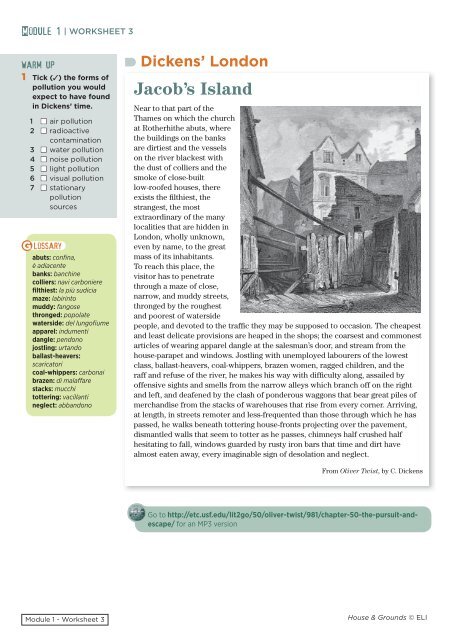
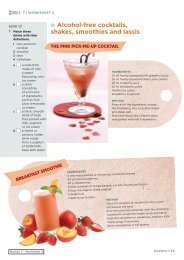
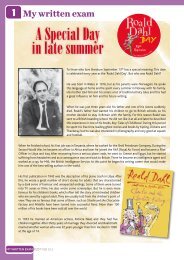
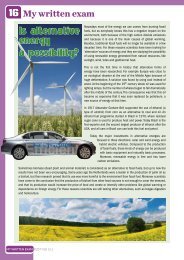
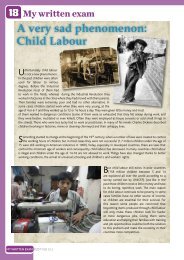
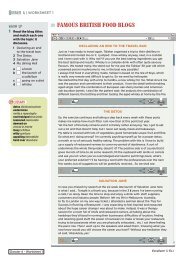
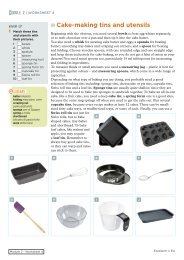

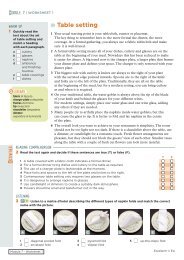
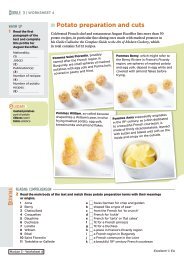
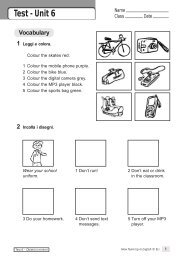

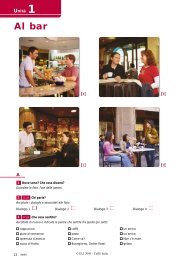
![Benvenuti! e Unità1 ESERCIZI [dZ] gelato [g] spaghetti](https://img.yumpu.com/7345193/1/184x260/benvenuti-e-unita1-esercizi-dz-gelato-g-spaghetti.jpg?quality=85)
